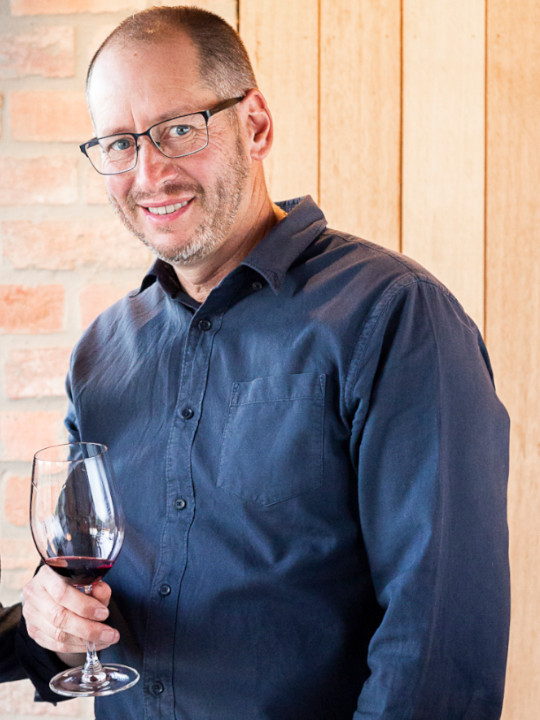
Marc Scalzo
Owner and Vigneron at Piano Piano Wines
“To me, wine belongs at the table, enjoyed with family and good food.”
When did you realise you wanted to become a winemaker?
I first realised I wanted to become a winemaker at the kitchen table. My father, Mario, introduced me to a wide selection of local wines and that early exposure sparked a lifelong interest in wine and its provenance. After studying science at Monash University and working in the corporate world at IBM, the lure of wine was always strong. Eventually, I chose to follow that calling, studying Wine Science at Charles Sturt University and gaining hands-on experience through vintages at renowned wineries both in Australia and overseas. That journey confirmed that winemaking wasn’t just an interest, but the career I wanted to dedicate myself to.
Please tell us about your career so far.
After completing a Bachelor of Science at Monash University, I studied Bachelor Wine Science at Charles Sturt University. During this period, I worked vintages at John Gehrig wines, Giaconda and Delegat and Seresin Estate in New Zealand.
After my degree I worked for seven years at Brown Brothers starting as a cellar hand and working up to a winemaker. I then worked for seventeen years in Rutherglen as a winemaker at a winery that is now owned by De Bortoli Wines. I have judged numerous wine shows and was nominated for the Gourmet Traveller Wine as Winemaker of the Year in 2016.
What do you love most about being a winemaker?
What I love most about being a winemaker is the ability to let the vineyard tell its own story. For me, it’s not about imposing my personality on the wines, but capturing the unique character of our Beechworth property and the granitic soils that define it.
Each vintage reflects the place, season and care in the vineyard. I also love the connection between family and the wines we make – from planting vines the same year our children were born, to naming blends after them and my father. Winemaking allows me to combine science, creativity and tradition while producing something that can be shared and enjoyed with others.
What is your favourite wine, and what food do you typically pair it with?
That’s a hard question, but I always come back to chardonnay. I love how chardonnay responds to both its vineyard but also to the winemaker. There are so many decisions that all come together in the wine. For me, the stand-out chardonnay in Australia is still the Giaconda. I love how it connects directly with where it’s from. To me, wine belongs at the table, enjoyed with family and good food.
Is there a specific process you follow in developing a new wine?
I always research new wines by looking at good examples that grow in similar climates and see how they perform. The most important decision is always what to plant where!
Is there a specific vintage you are particularly proud of creating? Why?
I’m especially proud of our Sophie’s Block Chardonnay from the mid-2010s – particularly the 2015 and 2016 vintages. The 2015 delivered layers of complexity with its truffle-like aromas, creamy lees and granular minerality, earning a near-perfect score of ninety-six in James Halliday’s Wine Companion. 2016 followed closely behind at ninety-five points, showcasing a savoury, flinty style with citrus and white-peach brightness wove through delicate oak. It’s rare to capture both the power and purity of our granitic Beechworth soils so beautifully.
I’d also be remiss not to mention the 2018 vintage, which won gold and ninety-four points at the Victorian Wine Show – a further affirmation that letting the vineyard speak slowly, truly pays off.
How does the local climate/soil affect the wine you make?
Our Beechworth vineyard sits on the region’s renowned granitic soils, which bring elegance, purity and a distinctive mineral edge to the wines. The elevated, cool-climate conditions allow the grapes to ripen slowly, building flavour while retaining natural acidity. This combination gives our chardonnay its precision and freshness, and
our shiraz a balance of spice, structure and finesse. Ultimately, the unique climate and soil provide the foundation for wines with a strong sense of place – something we’ve always strived to express.
Which of your own varieties do you typically indulge in?
When do I indulge in one of our wines, it’s often the Sophie’s Block Chardonnay. It holds a special place for me, not only because it reflects the character of our Beechworth vineyard and its granitic soils, but also because it’s tied to family.
We planted the chardonnay in 2006, the year our daughter Sophie was born. The wine always shows such precision, freshness and elegance, with a lovely balance of fruit and minerality. For me, it captures both the sense of place and a very personal connection, which makes opening a bottle rewarding. We bought our property to grow chardonnay so it’s very satisfying to taste the final product.
Where do you see yourself in five years? How do you think your winemaking will evolve during this time?
For us, Piano Piano has always been about patience, family and place – planting vines, nurturing them and letting them evolve over time. Looking ahead, we’re excited to see how our vineyard continues to mature and how that depth will show through in the wines.
We’ll keep focusing on chardonnay and shiraz from our estate, refining our craft and staying true to the idea of letting the vineyard speak for itself. We have also planted one acre of tempranillo so I am excited to see where this takes us. Most of all, we want to keep sharing the wines that reflect our family and the Beechworth landscape we love, one vintage at a time.
From Wineries of Victoria – Issue 16, edited by Jessica Muller
